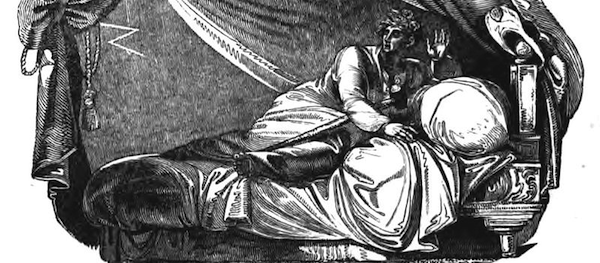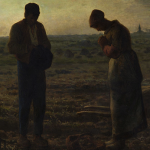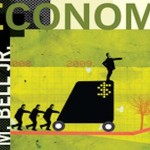Writing about John Bunyan’s Pilgrim’s Progress, Samuel Taylor Coleridge said, “I could not have believed beforehand that Calvinism could be painted in such exquisitely delightful colors.” It’s a fascinating comment about a book whose wisdom we are in danger of forgetting as millennial Christians. To take only one example, consider Bunyan’s discussion of doubt and despair found a little past the book’s halfway mark.
In the scene, Christian and Hopeful have been taken captive by the Giant Despair and locked in the dungeon of Doubting-Castle. It’s a fascinating section in many ways, not least of which for the ways Bunyan plays with the relationship between confidence and despair. The first man Christian and Hopeful meet after leaving the straight path is a man named Vain-Confidence who presses on ahead and falls into a pit to his death. Upon hearing his cry as he fell, Christian and Hopeful stop for the night and fall asleep, planning to backtrack and return to the path in the morning. But before they awake, the Giant Despair comes upon them, seizes them, and throws them in his dungeon. Here, Bunyan introduces Despair’s wife—and her name is most curious: Diffidence, a word which means a lack of confidence.
There’s a second thing that Bunyan brings into the story at this point that helps clarify this discussion of confidence, doubt, and despair. Bunyan goes out of his way to identify the days of their captivity as running from Wednesday to Saturday. They are taken on Wednesday, beaten on Thursday, Friday, and Saturday. On Friday and Saturday, Christian despairs for his life and contemplates suicide, only being kept from that path by the counsel of Hopeful. Then on Sunday Christian recognizes that he has a key called Promise that opens every lock in Doubting Castle. And so, using this key, Christian and Hopeful escape the Giant Despair, his wife Diffidence, and Doubting Castle (they also escape the fate of Vain-Confidence and make it safely back to the narrow road).
The point Bunyan would have us see is that as long as we insist on going our own way—lighting our own sparks, as Edith Schaeffer was fond of saying—we are doomed to despair. But Christ’s Easter Resurrection and the promise it gives to us of future restoration saves us from the Despair of both vain confidence and diffidence, each of which represent a sort of doubt. Vain confidence is a form of doubt because it represents a doubting in the goodness of God’s intentions for us and a misplaced trust in our own judgment. Likewise, diffidence is doubt for reasons more obvious. It reflects a fundamental reluctance to trust God’s promise and stake our lives on it.
But in Bunyan’s marvelous tale, on Sunday after three days of beating, they are freed by the key Promise. To Bunyan, then, claiming the promises guaranteed to us on Easter Sunday is the way through the question of vain confidence and diffidence and the way out of Doubting Castle’s dungeon.
Three reflections:
1) Do we see doubt in the same way as Bunyan? Admittedly, Pilgrim’s Progress is not scripture so we oughtn’t treat it as an inerrant text. Nonetheless, it’s a text that Christians have almost universally found helpful and beneficial since it’s publication 334 years ago. Given that, it’s worrisome that something Bunyan saw as the home of Despair is today seen in far more sympathetic, friendly terms. We would do well to recover Bunyan’s suspicion of doubt, even while also striving to respond to honest questions with respectful, honest answers. (And on these points, we could do worse than reading Matthew Lee Anderson’s forthcoming The End of Our Exploring. I’ve read a manuscript of the book and it is a marvelous exploration of how to question well, one which manages to criticize our faddish affection for doubt without falling into the errors of previous generations.)
2) An honest assessment of doubt’s current trendiness amongst evangelicals will also include an admission that it’s become popular as an over-reaction to the perceived dogmatism of the previous generation. In some cases, that’s probably more perception than reality on the part of millennials. But in cases when it is true, the solution remains the same according to Bunyan, who saw both vain confidence and diffidence as being symptoms of the same sin of doubt which leads to despair. It is through the promises of God that we are saved from both species of doubt.
3) It’d likely annoy him to be linked closely with a Nonconformist like Bunyan, but here Chesterton’s discussion of humility in Orthodoxy seems especially relevant:
But what we suffer from to-day is humility in the wrong place. Modesty has moved from the organ of ambition. Modesty has settled upon the organ of conviction; where it was never meant to be. A man was meant to be doubtful about himself, but undoubting about the truth; this has been exactly reversed. Nowadays the part of a man that a man does assert is exactly the part he ought not to assert—himself. The part he doubts is exactly the part he ought not to doubt—the Divine Reason. Huxley preached a humility content to learn from Nature. But the new sceptic is so humble that he doubts if he can even learn. Thus we should be wrong if we had said hastily that there is no humility typical of our time. The truth is that there is a real humility typical of our time; but it so happens that it is practically a more poisonous humility than the wildest prostrations of the ascetic. The old humility was a spur that prevented a man from stopping; not a nail in his boot that prevented him from going on. For the old humility made a man doubtful about his efforts, which might make him work harder. But the new humility makes a man doubtful about his aims, which will make him stop working altogether.
At any street corner we may meet a man who utters the frantic and blasphemous statement that he may be wrong. Every day one comes across somebody who says that of course his view may not be the right one. Of course his view must be the right one, or it is not his view. We are on the road to producing a race of men too mentally modest to believe in the multiplication table. We are in danger of seeing philosophers who doubt the law of gravity as being a mere fancy of their own. Scoffers of old time were too proud to be convinced; but these are too humble to be convinced. The meek do inherit the earth; but the modern sceptics are too meek even to claim their inheritance. It is exactly this intellectual helplessness which is our second problem.
We might also remember the words of John Henry Newman, who wrote that, “a thousand difficulties do not make one doubt.” To Bunyan, both vain confidence (we might say arrogance today) and doubt are products of the same basic failing—forgetting what was promised to the Christian. But when Christian remembers the promise, he’s freed. Approached this way, the promises of God (which we know through scripture) allow us to move through both arrogance and doubt. There’s some epistemological issues to unpack with that, but it is a good move and a move faithful to our tradition. Would that it were also a more common move in the contemporary Christian mind.
[Image of Tender Conscience from Wikipedia]













